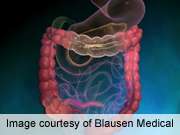For patients with cancer with Clostridium difficile-associated diarrhea, fidaxomicin treatment is associated with improved outcomes compared with vancomycin treatment, according to research published online May 28 in the Journal of Clinical Oncology.
(HealthDay)—For patients with cancer with Clostridium difficile-associated diarrhea (CDAD), fidaxomicin treatment is associated with improved outcomes compared with vancomycin treatment, according to research published online May 28 in the Journal of Clinical Oncology.
Oliver A. Cornely, M.D., from the University Hospital of Cologne in Germany, and colleagues conducted two double-blind trials involving 1,105 patients with CDAD, 183 of whom had cancer, to treatment with fidaxomicin or vancomycin.
The researchers found that the cure rate was lower and time to resolution of diarrhea (TTROD) was longer for patients with versus without cancer. Compared with vancomycin, fidaxomicin treatment correlated with significantly increased odds of cure (odds ratio, 2.0), reduced likelihood of recurrence (odds ratio, 0.37), and more frequent sustained response (odds ratio, 2.56). For those treated with vancomycin, the median TTROD was significantly longer in patients with versus without cancer (123 versus 58 hours), while with fidaxomicin treatment, the median TTROD was not significantly different for those with and without cancer (74 and 54 hours, respectively). Age, hypoalbuminemia, and cancer correlated inversely with clinical cure in multivariate analysis of the full modified intent-to-treat population. Vancomycin treatment significantly predicted recurrence. Low albumin correlated negatively and fidaxomicin correlated positively with improved cure among patients with cancer.
"For patients with cancer, fidaxomicin treatment was superior to vancomycin, resulting in higher cure and sustained response rates, shorter TTROD, and fewer recurrences," the authors write.
Several authors disclosed financial ties to pharmaceutical companies, including Optimer Pharmaceuticals, which funded the study and manufactures fidaxomicin.
More information:
Abstract
Full Text (subscription or payment may be required)
Journal information: Journal of Clinical Oncology
Health News Copyright © 2013 HealthDay. All rights reserved.























